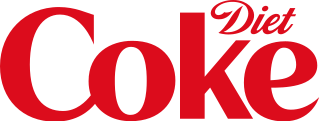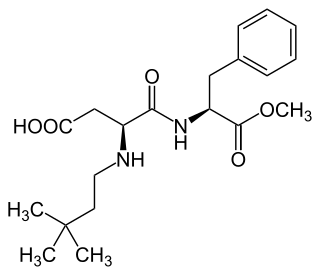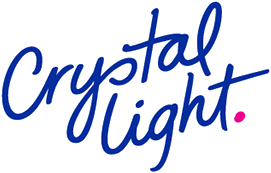
Assugrin is a brand name for a sugar substitute that is a blend of cyclamate and saccharin. [1] Produced in Switzerland by MCM Klosterfrau Vertriebsgesellschaft, [2] Assugrin was the main table sweetener in West Germany. [3]

Assugrin is a brand name for a sugar substitute that is a blend of cyclamate and saccharin. [1] Produced in Switzerland by MCM Klosterfrau Vertriebsgesellschaft, [2] Assugrin was the main table sweetener in West Germany. [3]
Cyclamate sugar substitute was discovered in 1937 by two American chemists and tested over the subsequent twenty years. After cyclamate was declared safe for consumption in the mid-1950s, the Hermes Company announced their new product, Assugrin, in 1954. [4] More than a decade later, in 1965, Hermes company came up with a mixture of saccharin and cyclamate. It was later introduced to the market under the brand name Assugrin. In that same year, aspartame was discovered. Aspartame was introduced into the Assugrin brand as Assugrin Gold.
In 1987, orange and lemon varieties were added to the West German low-calorie soft drink Assugrin Exquisit. [5] In 1990, Albi launched Assugrin Aktiv (Iso-Mineral-Fitness-Drink), a reduced calorie sports drink. [6] Hermes Sweeteners Ltd introduced Assugrin Light blended sweetener as a "special diet food" in 1995. [7]
In 2002, the Assugrin brand was introduced in Brazil through a new dietetic sweetener made with saccharin, water, artificial sweeteners, and sodium cyclamate. [8]
In 2003, Swiss sweeteners producer Hermes Edulcorants, headquartered in Zürich, generated 67 million Swiss francs ($53.2 million/€44.4 million) for 2003. [4] Their brand, the Assugrin sweetener, was being sold in about 100 countries, but mainly in Switzerland, Germany, and Austria. [4] Assugrin also has a presence in Spain and Brazil. [4]

Sucralose is an artificial sweetener and sugar substitute. As the majority of ingested sucralose is not metabolized by the body, it adds very little food energy. In the European Union, it is also known under the E number E955. It is produced by chlorination of sucrose, selectively replacing three of the hydroxy groups—in the C1 and C6 positions of the fructose portion and the C4 position of the glucose portion—to give a 1,6-dichloro-1,6-dideoxyfructose–4-chloro-4-deoxygalactose disaccharide. Sucralose is about 600 times sweeter than sucrose, 3 times as sweet as both aspartame and acesulfame potassium, and 2 times as sweet as sodium saccharin.

A sugar substitute is a food additive that provides a sweetness like that of sugar while containing significantly less food energy than sugar-based sweeteners, making it a zero-calorie or low-calorie sweetener. Artificial sweeteners may be derived through manufacturing of plant extracts or processed by chemical synthesis. Sugar substitute products are commercially available in various forms, such as small pills, powders, and packets.

Diet Coke is a sugar-free and low-calorie soft drink produced and distributed by the Coca-Cola Company. It contains artificial sweeteners instead of sugar. Unveiled on July 8, 1982, and introduced in the United States one month later, it was the first new brand since Coca-Cola's creation in 1886 to use the Coca-Cola trademark. The product quickly overtook the company's existing diet cola, Tab, in sales.

Cyclamate is an artificial sweetener. It is 30–50 times sweeter than sucrose, making it the least potent of the commercially used artificial sweeteners. It is often used with other artificial sweeteners, especially saccharin; the mixture of 10 parts cyclamate to 1 part saccharin is common and masks the off-tastes of both sweeteners. It is less expensive than most sweeteners, including sucralose, and is stable under heating. Safety concerns led to it being banned in a few countries, though the European Union considers it safe.

Neohesperidin dihydrochalcone, sometimes abbreviated to neohesperidin DC or simply NHDC, is an artificial sweetener derived from citrus.

Saccharin, also called saccharine, benzosulfimide, or E954, or used in saccharin sodium or saccharin calcium forms, is a non-nutritive artificial sweetener. Saccharin is a sultam that is about 500 times sweeter than sucrose, but has a bitter or metallic aftertaste, especially at high concentrations. It is used to sweeten products, such as drinks, candies, baked goods, tobacco products, excipients, and for masking the bitter taste of some medicines. It appears as white crystals and is odorless.

Acesulfame potassium, also known as acesulfame K or Ace K, is a synthetic calorie-free sugar substitute often marketed under the trade names Sunett and Sweet One. In the European Union, it is known under the E number E950. It was discovered accidentally in 1967 by German chemist Karl Clauss at Hoechst AG. Acesulfame potassium is the potassium salt of 6-methyl-1,2,3-oxathiazine-4(3H)-one 2,2-dioxide. It is a white crystalline powder with molecular formula C
4H
4KNO
4S and a molecular weight of 201.24 g/mol.

Diet or light beverages are generally sugar-free, artificially sweetened beverages with few or no calories. They are marketed for diabetics and other people who want to reduce their sugar and/or caloric intake.

Tab was a diet cola soft drink produced and distributed by The Coca-Cola Company, introduced in 1963 and discontinued in 2020. The company's first diet drink, Tab was popular among some people throughout the 1960s and 1970s as an alternative to Coca-Cola. Several variations were made, including a number of fruit-flavored, root beer, and ginger ale versions. Caffeine-free and clear variations were released in the late 1980s and early 1990s.
Diet Rite is an American brand of no-calorie soft drinks that was originally distributed by the RC Cola company.

Neotame, also known by the brand name Newtame, is a non-caloric artificial sweetener and aspartame analog by NutraSweet. By mass, it is 7,000 to 13,000 times sweeter than sucrose. It has no notable off-flavors when compared to sucrose. It enhances original food flavors. It can be used alone, but is often mixed with other sweeteners to increase their individual sweetness and decrease their off-flavors. It is chemically somewhat more stable than aspartame. Its use can be cost effective in comparison to other sweeteners as smaller amounts of neotame are needed.

Pepsi Max is a low-calorie, sugar-free cola, marketed by PepsiCo as an alternative to Pepsi and Diet Pepsi, except for Norway, where it is the main Pepsi flavor. Pepsi Max is available primarily in Asian, European and Australia/New Zealand markets. While Pepsi Max was released in April 1993, it did not become available in the United States until 2007. In the US this different product was renamed Pepsi Zero Sugar in 2016.
Red Kola is a carbonated soft drink made from fruit extracts, and may include flavouring from the kola nut. Red Kola is made by various firms including Currie's, Solripe, and A.G. Barr.

Sweet'n Low is a brand of artificial sweetener now made primarily from granulated saccharin. When introduced in 1958 in the United States, Sweet'n Low was cyclamate-based, but it was replaced by a saccharin-based formulation in 1969. It is also a brand name applied to a family of sweetener and sweetened products, some containing sweeteners other than saccharin or cyclamate. There have been over 500 billion Sweet'N Low packets produced.

Diet Pepsi, currently stylised in all caps as Pepsi Diet, is a diet carbonated cola soft drink produced by PepsiCo, introduced in 1964 as a variant of Pepsi with no sugar. First test marketed in 1963 under the name Patio Diet Cola, it was re-branded as Diet Pepsi the following year, becoming the first diet cola to be distributed on a national scale in the United States. In the 1960s and 1970s, its competition consisted of the Coca-Cola Company's subsequently discontinued Tab. The United States represents the largest single market for Diet Pepsi.

Crystal Light is an American brand of powdered and artificially sweetened beverage mixes produced by Kraft Heinz. It was introduced in 1982 to a test market and released to the public in April 1984. General Foods, a now defunct company, were the original sellers of the product, but now it is sold by Kraft Foods. It is available in a wide variety of flavors, such as lemonade, sweet tea, and fruit punch.

Cumberland Packing Corporation is a privately owned company located at 2 Cumberland Street, in Brooklyn, New York City. It was founded in 1945 by Benjamin Eisenstadt and is best known as the manufacturer, distributor, and marketer of Sweet'n Low, a saccharin-based zero-calorie sweetener sold in pink packets.
Fruit2O, formerly manufactured by Kraft, is a lightly flavored, non-carbonated water beverage introduced in 1999. Fruit2o was introduced to compete not only with the bottled water market but also with the soft drink market. Sunny Delight Beverages purchased the Veryfine Products line from Kraft in 2007.

Pepsi Next is a discontinued cola-flavored carbonated soft drink produced by PepsiCo. It was a variant of the Pepsi cola range.
A drink mix is a processed-food product, designed to mix usually with water to produce a beverage resembling juice, soda, or other sweet products in flavor. Another type of drink mix is represented by products that are mixed into milk. Most drink mixes are powdered, but some are liquefied.